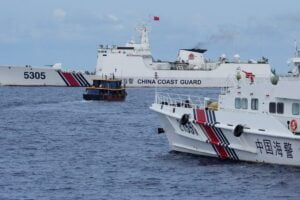Top diplomats hold ‘direct, candid’ talks in Munich amid tensions over Russia’s invasion of Ukraine and the downing of a suspected Chinese spying balloon.
US Secretary of State Antony Blinken has warned China against providing “lethal support” for Russia’s invasion of Ukraine and condemned the violation of United States airspace by an alleged Chinese spying balloon as he held rare talks with Beijing’s top diplomat, Wang Yi.
The meeting of the two senior officials happened late on Saturday on the sidelines of a global security conference in Munich, Germany, just hours after Wang scolded Washington as “hysterical” in a running dispute over the US’s downing of the suspected Chinese spy balloon.
Relations between the two countries have been fraught since Washington said China flew a spy balloon over the country before US fighter jets shot it down on President Joe Biden’s orders. The dispute also came at a time when the West is closely watching Beijing’s response to the Ukraine war.
In an interview to be aired on Sunday morning on NBC News’s “Meet the Press with Chuck Todd,” Blinken said the US was very concerned that China is considering providing lethal support to Russia and that he made clear to Wang that “would have serious consequences in our relationship”.
“There are various kinds of lethal assistance that they are at least contemplating providing, to include weapons,” Blinken said, adding that Washington would soon release more details.
Speaking to reporters in a briefing call, a senior State Department official said China was trying to “have it both ways” by claiming it wants to contribute to peace and stability but at the same time taking “concerning” steps to support Russia’s invasion of Ukraine.
“[The] secretary was quite blunt in warning about the implications and consequences of China providing material support to Russia or assisting Russia with systematic sanctions evasion,” the senior official said, speaking on the condition of anonymity.
Russia and China signed a “no limits” partnership last February shortly before Russian forces invaded Ukraine, and their economic links have boomed as Moscow’s connections with the West have shrivelled.
The West has been wary of China’s response to the Ukraine war, with some warning that a Russian victory would colour China’s actions towards Taiwan. China has refrained from condemning the war or calling it an “invasion”.
Earlier, speaking at a panel at the conference, Wang reiterated a call for dialogue and suggested European countries “think calmly” about how to end the war.
He also said there were “some forces that seemingly don’t want negotiations to succeed, or for the war to end soon,” without specifying to whom he was referring.
No apology
During his meeting with Wang, Blinken also condemned the incursion of the alleged Chinese surveillance balloon and “stressed it must never happen again,” the secretary of state said in a tweet.
The balloon’s flight this month over US territory triggered an uproar in Washington and prompted Blinken to postpone a planned visit to Beijing. That February 5-6 trip would have been the first by a US secretary of state to China in five years and was seen by both sides as an opportunity to stabilise increasingly fraught ties.
In the interview with NBC, Blinken said Wang did not apologise for the balloon’s flight.
“I told him quite simply that that was unacceptable,” Blinken said, referring to the balloon’s violation of US air space, adding that he had not discussed with Wang rescheduling his trip to China.
China reacted angrily when the US military downed the 60-metre (200-ft) balloon on February 4, saying it was for monitoring weather conditions and had blown off course. Washington said it was clearly a surveillance balloon with a massive undercarriage holding electronics.
For his part, Wang told Blinken that their countries’ relations had been damaged by how Washington reacted to the balloon, according to Chinese state news agency Xinhua.
Wang “made clear China’s solemn position on the so-called airship incident” and “urged the US side to change course, acknowledge and repair the damage that its excessive use of force caused to China-US relations,” Xinhua reported.
Speaking earlier on Saturday, Wang had condemned the US reaction to the balloon as “hysterical and absurd”.
“To have dispatched an advanced fighter jet to shoot down a balloon with a missile, such behaviour is unbelievable, almost hysterical,” he said.
Wang also accused the US of denying China’s economic advances and seeking to impede its further development.
“What we hope for from the US is a pragmatic and positive approach to China that allows us to work together,” he said.
Questions had swirled as to whether Blinken and Wang would use the conference in Munich as a chance to reengage in person, and the State Department only confirmed the hour-long meeting after it had ended.
Washington had been hoping to put a “floor” under relations that hit a dangerous low in August with China’s reaction to a Taiwan visit by then-US House of Representatives Speaker Nancy Pelosi.
Hopes for a reset could be tested again soon, with a high-level Pentagon official arriving in Taiwan for a visit, according to a Financial Times report on Friday.
Also in Munich, US Vice President Kamala Harris underlined how Washington was “troubled that Beijing has deepened its relationship with Moscow since the war began”.
She said that “looking ahead, any steps by China to provide lethal support to Russia would only reward aggression, continue the killing and further undermine a rules-based order”.
source: aljazeera










